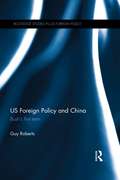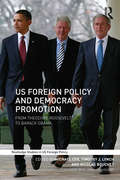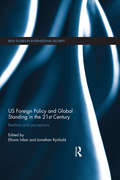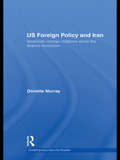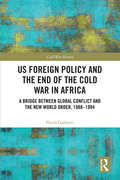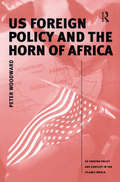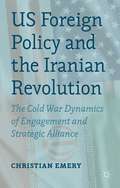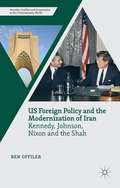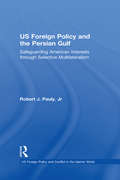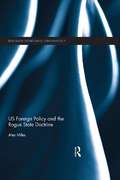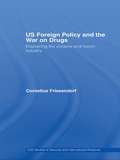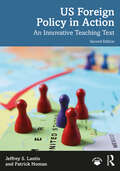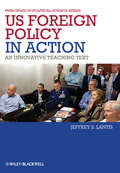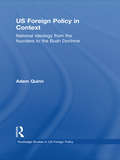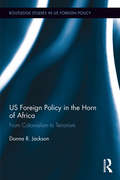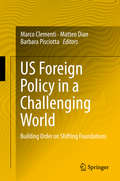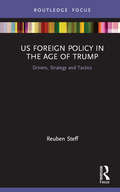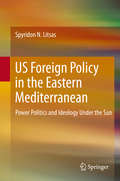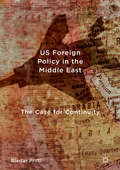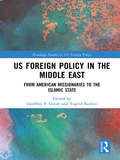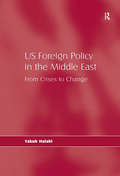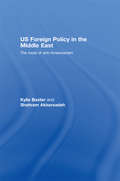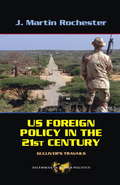- Table View
- List View
US Foreign Policy and China: Bush’s First Term (Routledge Studies in US Foreign Policy)
by Guy RobertsThis work is an exploration of how U.S.-China relations were managed by President George W. Bush. Roberts argues that contrary to conventional wisdom, President Bush conducted a calculated, pragmatic and highly successful strategy toward Beijing, which avoided conflict, resolved crisis and significantly increased economic and diplomatic ties. Roberts identifies key players and polices of the Bush White House and the specific themes of engagement (successful and unsuccessful) that unfolded during Bush’s first term. Research is based on analysis of primary and secondary documentation, as well as interviews with key White House actors (including Deputy Secretary of State Richard Armitage), and two former Australian Prime Ministers. Topics of discussion include China’s changing attitude toward international engagement, China’s rising economic power and the tensions this triggered in the American establishment, the nature of U.S. China relations, contemporary and ideological understanding of the Bush Presidency as well as the strengths and weaknesses of different sources of information. US Foreign Policy and China will be of great interest to students and scholars of US foreign policy and China Studies.
US Foreign Policy and Democracy Promotion: From Theodore Roosevelt to Barack Obama (Routledge Studies in US Foreign Policy)
by Michael Cox Nicolas Bouchet Timothy J. LynchThe promotion of democracy by the United States became highly controversial during the presidency of George W. Bush. The wars in Iraq and Afghanistan were widely perceived as failed attempts at enforced democratization, sufficient that Barack Obama has felt compelled to downplay the rhetoric of democracy and freedom in his foreign-policy. This collection seeks to establish whether a democracy promotion tradition exists, or ever existed, in US foreign policy, and how far Obama and his predecessors conformed to or repudiated it. For more than a century at least, American presidents have been driven by deep historical and ideological forces to conceive US foreign policy in part through the lens of democracy promotion. Debating how far democratic aspirations have been realized in actual foreign policies, this book draws together concise studies from many of the leading academic experts in the field to evaluate whether or not these efforts were successful in promoting democratization abroad. They clash over whether democracy promotion is an appropriate goal of US foreign policy and whether America has gained anything from it. Offering an important contribution to the field, this work is essential reading for all students and scholars of US foreign policy, American politics and international relations.
US Foreign Policy and Global Standing in the 21st Century: Realities and Perceptions
by Jonathan Rynhold Efraim InbarThis book examines US foreign policy and global standing in the 21st Century. The United States is the most powerful actor in world politics today. Against this backdrop, the present volume examines how the foreign policies pursued by Presidents’ George W. Bush and Barack Obama have affected elite and public perceptions of the United States. By examining America’s standing from the perspective of different actors from across various regions, including China, Russia, Latin America and the Middle East, while also assessing how these perceptions interact with America’s own policies, this books presents a fresh interpretation of America’s global standing. In doing so, the volume evaluates how these perceptions affect the realities of US power, and what impact this has on moulding US foreign policy and the policies of other global powers. A number of books address the question of which grand strategy the United States should adopt and the issue of whether or not America is in relative decline as a world power. However, the debate on these issues has largely been set against the policies of the Bush administration. By contrast, this volume argues that while Obama has raised the popularity of America since the low reached by Bush, America’s credibility and overall standing have actually been damaged further under President Obama. This book will be of much interest to students of US foreign policy, US national security, strategic studies, Middle Eastern politics, international relations and security studies generally.
US Foreign Policy and Iran: American-Iranian Relations since the Islamic Revolution (Contemporary Security Studies)
by Donette MurrayUS Foreign Policy and Iran is a study of US foreign policy decision-making in relation to Iran and its implications for Middle Eastern relations. It offers a new assessment of US-Iranian relations by exploring the rationale, effectiveness and consequences of American policy towards Iran from the aftermath of the 1979 Iranian Revolution to the present day. As a key country in a turbulent region and the recipient of some of the most inconsistent treatment meted out during or after the Cold War, Iran has been both one of America's closest allies and an 'axis of evil' or 'rogue' state, targeted by covert action and contained by sanctions, diplomatic isolation and the threat of overt action. Moreover, since the attacks of 11 September 2001, Iran has played a significant role in the war on terror while also incurring American wrath for its links to international terror and its alleged pursuit of a nuclear weapons programme. US Foreign Policy and Iran will be of interest to students of US foreign policy, Iran, Middle Eastern Politics and international security in general Donette Murray is a Senior Lecturer in the Department of Defence and International Affairs at the Royal Military Academy Sandhurst. She was awarded a PhD in International History by the University of Ulster in 1997.
US Foreign Policy and the End of the Cold War in Africa: A Bridge between Global Conflict and the New World Order, 1988-1994 (Cold War History)
by Flavia GasbarriThis book investigates the end of the Cold War in Africa and its impact on post-Cold War US foreign policy in the continent. The fall of the Berlin Wall is widely considered the end of the Cold War; however, it documents just one of the many "ends", since the Cold War was a global conflict. This book looks at one of the most neglected extra-European battlegrounds, the African continent, and explores how American foreign policy developed in this region between the late 1980s and the early 1990s. Drawing on a wide range of recently disclosed documents, the book shows that the Cold War in Africa ended in 1988, preceding the fall of the Berlin Wall. It also reveals how, since then, some of the most controversial and inconsistent episodes of post-Cold War US foreign policy in Africa have been deeply rooted in the unique process whereby American rivalry with the USSR found its end in the continent. The book challenges the traditional narrative by presenting an original perspective on the study of the end of the Cold War and provides new insights into the shaping of US foreign policy during the so-called ‘unipolar moment’. This book will be of much interest to students of Cold War history, US foreign policy, African politics and international relations.
US Foreign Policy and the Horn of Africa (US Foreign Policy and Conflict in the Islamic World)
by Peter WoodwardExamining US involvement in the Horn of Africa, this volume addresses the relationship between the US and the Islamic movement in this region. Peter Woodward explores the interests of the United States in the region through two cases: Sudan and Somalia. He also discusses the effects of the Eritrean-Ethiopian war on US policy and posture in the region, along with the effects of other regional wars. The book looks at the relationship between US perceptions of Islamism and brings a unique perspective to the ongoing debate over US policy in the Islamic world. It will be of interest to those working in or researching foreign policy, as well as peace, security and conflict issues.
US Foreign Policy and the Iranian Revolution
by Christian EmeryThis book provides a fresh perspective on the origins of the confrontation between the US and Iran. It demonstrates that, contrary to the claims of Iran's leaders, there was no instinctive American hostility towards the Revolution, and explains why many assumptions guiding US policy were inappropriate for dealing with the new reality in Iran.
US Foreign Policy and the Modernization of Iran: Kennedy, Johnson, Nixon, and the Shah (Security, Conflict and Cooperation in the Contemporary World)
by Johnson Kennedy Nixon the ShahUS Foreign Policy and the Modernization of Iran examines the evolution of US-Iranian relations during the presidencies of John F. Kennedy, Lyndon B. Johnson, and Richard M. Nixon. It demonstrates how successive administrations struggled to exert influence over the Shah of Iran's regime domestic and foreign policy.
US Foreign Policy and the Persian Gulf: Safeguarding American Interests through Selective Multilateralism (US Foreign Policy and Conflict in the Islamic World)
by Jr Robert J. PaulyRobert J. Pauly, Jr examines the history of US foreign policy toward the Greater Middle East in general and focuses specifically on the fundamental economic, military and political causes of the 1990-1991 Persian Gulf crisis. He investigates to what extent these causes were internal and external in origin, looks at the principal actors in the crisis, and determines whether and how these actors have continued to drive unfolding events in the Persian Gulf ever since. The volume explores in detail the role of American leaders since 1989, including how far the US should collaborate with Europe to pursue both American and collective Western economic, military and political interests in the Gulf. It also considers the prospects for the future of American-led nation-building operations in Iraq and the outlook for the eventual liberal democratization of the Greater Middle East.
US Foreign Policy and the Rogue State Doctrine (Routledge Studies in US Foreign Policy)
by Alex MilesConcerns over Iran’s nuclear programme, North Korea’s nuclear brinkmanship and, in the past, Iraq’s apparent pursuit of WMD have captured the world’s attention, and dominated the agenda of the American foreign policy establishment. But, what led policymakers and the US military to emphasise the threat of rogue states at the end of the Cold War? Going behind the vivid language of the ‘axis of evil’ and portrayals of undeterrable and reckless rogue states, this work demonstrates how the rogue state doctrine satisfied both domestic and international goals in the Clinton and George W. Bush administrations, underpinning efforts to maintain US leadership and hegemony. It offers a clear picture of the policymaking process, taking a broad, historical approach that places the actions of US officials towards Iraq, Iran, North Korea, Libya and Cuba in a wider context. Through an understanding of the long-standing influences on the US approach we are better able to appreciate why, for instance, regime change dominated the post-9/11 agenda and led to the overthrow of Saddam Hussein. Explaining in detail how the tackling of rogue states became a central aim of US foreign policy, Miles examines whether there was continuity between the Clinton and Bush approach. He moves on to highlight the influence of Congress on the implementation of US policies and the difficulties the US faced in ‘selling’ its approach to allies and adapting its hard-line strategies to reflect developments within the targeted states. By considering the impulses and drivers behind the development of the rogue states approach, this work will extend the scope of existing work in the field and will be of interest to scholars and policymakers alike.
US Foreign Policy and the War on Drugs: Displacing the Cocaine and Heroin Industry (Css Studies In Security And International Relations)
by Cornelius FriesendorfThis book examines the geographic displacement of the illicit drug industry as a side effect of United States foreign policy. To reduce the supply of cocaine and heroin from abroad, the US has relied on coercion against farmers, traffickers and governments, but this has only exacerbated the world's drugs problems.US Foreign Policy and the War on Dr
US Foreign Policy in Action: An Innovative Teaching Text (Principles Of Political Science Ser.)
by Jeffrey S. Lantis Patrick HomanThis book represents a timely exploration of the dynamics of U.S.foreign policy development. It introduces historical developments and theories of U.S. foreign policy and engages students in the politics and debates of the foreign policy process (both directly and by proxy) through innovative learning exercises. This book offers a rich understanding of the politics behind clashing perspectives towards contemporary foreign policy challenges ranging from immigration policy controversies to COVID-19 pandemic responses, climate change to the China trade war. All of these issues are presented in dynamic ways that focus on activism and engagement in the policy process—and so this text speaks directly to a new generation of college students who have mobilized to political activism. The book is intended to serve as a core text for classes on U.S. foreign policy at the 200-level or above and will appeal to a broad audience. New to the Second Edition: Provides insights on contemporary foreign policy challenges facing the Biden administration and future presidents, such as climate change, the rise of China, sanctions and trade policies, and changing U.S. engagement in the Middle East. Offers stronger theoretical foundations for the study of domestic constraints in the foreign policy decision-making process, including the power of interest groups and political polarization in Congress. Explains pedagogical treatments of online and hybrid learning applications, along with presenting new exercises to engage students both in person in the classroom and online. Presents more detailed and critical historical analyses of U.S. foreign policy, including greater attention to the U.S. as an imperial power and its implications for politics and society. Creates new and exciting active learning exercises for instructors and students, including role-playing simulations of global public health crisis management and group research projects on cybersecurity and immigration policy. Enriches the graphics and illustrations of foreign policy actors and processes in a full-color presentation. Analyzes contemporary foreign policy issues in the Trump and Biden administrations. Adds new web components and features, some authored by undergraduate students who are becoming experts in U.S. foreign policy. Includes new writing exercises and assignments designed to promote creative and critical thinking about foreign policy actors and processes.
US Foreign Policy in Action: An Innovative Teaching Text (Principles of Political Science #6)
by Jeffrey S. LantisThis innovative teaching text on United States foreign policy interprets the foreign policy decision-making process through the lens of political debate and exchange. It introduces historical developments and theories of U.S. foreign policy and engages students in the politics of the foreign policy process through innovative learning exercises. Features critical analysis of contemporary trends in U.S. foreign policy, including debates in the Obama administration, foreign policy and the 2012 presidential election, and reaction to the Arab Spring Written by an award-winning teacher-scholar in international relations, with extensive experience in both policy making and pedagogy Views foreign policy decision making through the lends of political debate Offers fresh perspectives on historical developments as well as surveying prominent foreign policy theories Includes new and innovative participatory learning exercises exploring a range of themes including executive/ legislature conflict Contains extensive teaching and learning applications, including discussion questions, document templates, worksheets, suggested readings, and links to web resources throughout
US Foreign Policy in Context: National Ideology from the Founders to the Bush Doctrine (Routledge Studies in US Foreign Policy)
by Adam QuinnThis work blends strategic analysis of contemporary US foreign policy with long-term historical discussion, producing an important argument relevant to the debates surrounding both the merits of contemporary US foreign policy and the long-term trends at work in American political culture. Rather than a detailed historical study of the Bush administration itself, the book seeks to locate Bush within the historical context of the US foreign policy tradition. It makes the case for nationally specific ideological factors as a driver of foreign policy and for importance of interaction between the domestic and the international in the emergence of national strategy. The contemporary element focuses on critiquing the George W. Bush administration’s National Security Strategy, perceived by many as a radical and unwelcome ideological departure from past policy, and its broader foreign policy, concentrating especially on its embrace of liberal universalism and rejection of realism. This critique is supported by the cumulative argument, based upon the historical cases, seeking to explain American leaders’ persistent resistance to the prescriptions of realism. Quinn argues for some causal connection between historically evolved ideological constructions and the character of the nation’s more recent international strategy. Providing a valuable addition to the field, this book will be of great interest to scholars in American politics, US foreign policy and US history.
US Foreign Policy in The Horn of Africa: From Colonialism to Terrorism (Routledge Studies in US Foreign Policy)
by Donna Rose JacksonExamining American foreign policy towards the Horn of Africa between 1945 and 1991, this book uses Ethiopia and Somalia as case studies to offer an evaluation of the decision-making process during the Cold War, and consider the impact that these decisions had upon subsequent developments both within the Horn of Africa and in the wider international context. The decision-making process is studied, including the role of the president, the input of his advisers and lower level officials within agencies such as the State Department and National Security Council, and the parts played by Congress, bureaucracies, public opinion, and other actors within the international environment, especially the Soviet Union, Ethiopia and Somalia. Jackson examines the extent to which influences exerted by forces other than the president affected foreign policy, and provides the first comprehensive analysis of American foreign policy towards Ethiopia and Somalia throughout the Cold War. This book offers a fresh perspective on issues such as globalism, regionalism, proxy wars, American aid programmes, anti-communism and human rights. It will be of great interest to students and academics in various fields, including American foreign policy, American Studies and Politics, the history of the Cold War, and the history of the Horn of Africa during the modern era.
US Foreign Policy in a Challenging World
by Matteo Dian Marco Clementi Barbara PisciottaThis book examines how the US is dealing with the challenge of reconciling its global interests with regional dynamics and how it is able to produce and sustain order at the system level and within regional subsystems. The book comprises four parts, the first of which addresses global issues such as nonproliferation, trade, and freedom of the seas. US policies in these areas are carefully analyzed, considering whether and how they have been differently implemented at the regional level. The remaining parts of the book focus on the US posture toward specific regions: Europe, the Middle East, and East Asia. The policies adopted by the US to confront the most relevant challenges in each region are identified, and the ways in which policies in a specific region influence or are influenced by challenges in another region are explored. The book is a rich source of knowledge on the nature of the balance that the US has pursued between global and regional interests. It will be of much interest to scholars, to practitioners, to postgraduate/PhD students of international relations theory and American foreign policy, and to all with an interest in the ability of the US to produce international order.
US Foreign Policy in the Age of Trump: Drivers, Strategy and Tactics
by Reuben SteffThis book investigates the drivers, tactics, and strategy that propel the Trump administration’s foreign policy. The key objective of this book is to look beyond the ‘noise’ of the Trump presidency in order to elucidate and make sense of contemporary US foreign policy. It examines the long-standing convictions of the president and the brutal worldview that he applies to US foreign policy; and his hard-line negotiation tactics and employment of unpredictability to keep America’s major foreign interlocutors off-guard, such as NATO members, China, Mexico, Canada, North Korea, and Iran – each of which are considered here. In strategy terms, the book explains that the president is responding to a new multipolar structure of power by engaging a Kissingerian strategy that eschews liberal values and seeks to adjust great power relations in Washington’s favor. By drawing upon a range of evidence and case studies, this book makes a number of compelling and provocative points to offer a new vector for debate about the workings, successes and failures, and ultimately the long-term implications for the world, of the Trump presidency. This book will be of much interest to students of US foreign policy, security studies, and IR in general.
US Foreign Policy in the Eastern Mediterranean: Power Politics and Ideology Under the Sun
by Spyridon N. LitsasThis book examines US foreign policy in the Eastern Mediterranean and the region’s key role in the practice and evolution of American exceptionalism. The political developments in the Eastern Mediterranean during the 19th and the first half of the 20th centuries, gave to the US opportunities to express, in the most explicit way, its anti-colonialism, the fervent support of open and democratic societies, and its willingness to openly confront tyranny and oppression whenever this was possible (or necessary) for American interests. Since that time, the region has been a testing ground for the core elements of American foreign policy deployed worldwide. The monograph shows the contributions of the United States during critical moments in the region, such as the First Barbary War (1801-1805), the introduction of Truman Doctrine, Washington’s role in the Suez Crisis, the Greek junta and the Imia Crisis of 1996. It also scrutinizes the different levels of the economic, military and diplomatic challenges which China, Russia and Turkey present today, while it also covers the American approach to the Arab Spring. From a ‘Shining City on a Hill’ to the current ‘Make America Great Again’ mottoes, this critique follows American Foreign Policy in the Eastern Mediterranean and the strong bonds that the nation established with the geostrategic, political and ideological features of the region. The pace of recent events, and the increasing complexity of this global corner, prove a challenge to America today; the future and clarion call that hard work and the finest ingenuity are necessary to keep its regional hegemony, and its course toward increased prosperity. This work’s goal is to inspire the conversations by academics, diplomats, leaders (both political and military) and most of all businessmen, to this end.
US Foreign Policy in the Middle East
by Bledar PriftiThis book provides a comprehensive historical overview of US foreign policy in the Middle East using the theoretical framework of offensive realism and highlighting the role of geography and regional power distribution in guiding foreign policy. It argues that the US has been pursuing the same geostrategic interests from President Truman's policy of containment to President Obama's speak softly and carry a big stick policy, and contends that the US-Iran relationship has been largely characterized by continued cooperation due to shared geostrategic interests. The book highlights the continuity in US foreign policy over the last seven decades and offers a prediction for US foreign policy in reaction to current and future global events. As such, it will serve as a reference guide for not only scholars but also policy analysts and practitioners.
US Foreign Policy in the Middle East: From American Missionaries to the Islamic State (Routledge Studies in US Foreign Policy)
by Geoffrey F. Gresh Tugrul KeskinThe dawn of the Cold War marked a new stage of complex U.S. foreign policy involvement in the Middle East. More recently, globalization and the region’s ongoing conflicts and political violence have led to the U.S. being more politically, economically, and militarily enmeshed – for better or worse—throughout the region. This book examines the emergence and development of U.S. foreign policy toward the Middle East from the early 1900s to the present. With contributions from some of the world’s leading scholars, it takes a fresh, interdisciplinary, and insightful look into the many antecedents that led to current U.S. foreign policy. Exploring the historical challenges, regional alliances, rapid political change, economic interests, domestic politics, and other sources of regional instability, this volume comprises critical analysis from Iranian, Turkish, Israeli, American, and Arab perspectives to provide a comprehensive examination of the evolution and transformation of U.S. foreign policy toward the Middle East. This volume is an important resource for scholars and students working in the fields of Political Science, Sociology, International Relations, Islamic, Turkish, Iranian, Arab, and Israeli Studies.
US Foreign Policy in the Middle East: From Crises to Change
by Yakub HalabiUS foreign policy in the Middle East has for the most part been shaped by the eruption of major crises that have revealed the deficiency in and bankruptcy of existing consensus and conceptions. Crises generate a new set of ideas to address the roots of the crisis and construct a new reality that would best serve US interests. Further, crises stimulate new ideological and ideational debates that de-legitimate existing practices and prevailing ideas. Yakub Halabi analyzes the way ideas and conceptions have guided US foreign policy in the Middle East, the erection of institutions through which these ideas were brought into practice, and the manner in which these ideas became obsolete and were modified by new ideas. The selection of crises examined is persuasive and provides a critical lens to observe important turning points in American foreign policy.
US Foreign Policy in the Middle East: The Roots of Anti-Americanism
by Shahram Akbarzadeh Kylie BaxterOver the last sixty years, Washington has been a major player in the politics of the Middle East. From Iran in the 1950s, to the Gulf War of 1991, to the devastation of contemporary Iraq, US policy has had a profound impact on the domestic affairs of the region. Anti-Americanism is a pervasive feature of modern Middle East public opinion. But far from being intrinsic to ‘Muslim political culture’, scepticism of the US agenda is directly linked to the regional policies pursued by Washington. By exploring critical points of regional crisis, Kylie Baxter and Shahram Akbarzadeh elaborate on the links between US policy and popular distrust of the United States. The book also examines the interconnected nature of events in this geo-strategically vital region. Accessible and easy to follow, it is designed to provide a clear and concise overview of complex historical and political material. Key features include: maps illustrating key events and areas of discontent text boxes on topics of interest related to the Arab/Israeli Wars, Iranian politics, foreign interventions in Afghanistan and Iraq, the wars of the Persian Gulf, September 11 and the rise of Islamist movements further reading lists and a selection of suggested study questions at the end of each chapter.
US Foreign Policy in the Twenty-First Century
by J. Martin RochesterIn this introductory textbook, Rochester (political science, U. of Missouri at St. Louis) examines the dilemmas of US foreign policy, which he finds analogous to the situation of Swift's Gulliver tied down by the Lilliputians. After providing a broad bush portrait of the international system, an introduction to the typical intellectual problems associated with the study of foreign policy, and a brief history of the conduct of US foreign policy from George Washington to George W. Bush, he turns to contemporary debates over neoconservatism, liberal internationalism, and realism and current issues concerning the "War on Terror," the Bush Doctrine of pre-emption, controlling weapons of mass destruction, humanitarian interventionism, and the International Criminal Court. Annotation ©2008 Book News, Inc. , Portland, OR (booknews. com)
US Foreign Policy in the Twenty-First Century
by J. Martin RochesterThe issues raised by the Iraq War are symptomatic of larger phenomena that will continue to preoccupy American foreign policy makers well into the twenty-first century. The war on terror, the proliferation of weapons of mass destruction, humanitarian intervention, and a litany of other concerns on the foreign policy agenda pose complex dilemmas for which there are no simple answers. Through lucid, lively analysis, as well as multiple illustrations and case studies, US Foreign Policy in the Twenty-First Century explores the difficult choices that confront the United States today in a complicated and often dangerous post-Cold War environment. Author J. Martin Rochester engages students in an intelligent examination of American foreign policy past, present, and future, involving them in critical thinking about how foreign policy is made, what factors affect foreign policy decisions and behavior, and how one might go about not only describing and explaining foreign policy but also evaluating it and prescribing solutions.
US Foreign Policy in the Twenty-First Century
by J. Martin RochesterThe issues raised by the Iraq War are symptomatic of larger phenomena that will continue to preoccupy American foreign policy makers well into the twenty-first century. The war on terror, the prolifer
